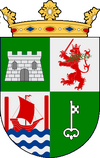| Gunndis | |
|---|---|

| |
| Gunndis | |
| Queen of Álengiamark | |
| Reign | 2nd September, 1666 - 31st November, 1702 |
| Predecessor | Elin VI |
| Successor | Elin VII |
| Born | 8th March, 1628 Róshálsinn, Margirhaedeyja Fylk, Álengiamark |
| Died | 31st November, 1702 Augljósborg, Unamiland Fylk, Álengiamark |
| Spouse | Jón Daníelsson |
| Issue | Soffía Jón |
| Full name | |
| Gunndis Tómassdottír | |
| House | Eiriksdottír |
| Father | Tómas Davíðsson |
| Mother | Halla Jóhannesdottír |
Gunndis was Queen of Álengiamark during the later 17th century.
Gunndis was sister-in-law to Elin VI of Álengiamark and was a prominent member of her court. On Elin's death in 1666 she was perfectly placed to be elected by the earls. She would continue in much the same vein as her predecessor; hosting the unofficial 'Earl's Thing' in the Great Hall of the Royal Palace in St. Hafdiss. This and her long reign slowly bound the earls and lords together on most issues meaning there was more cooperation between the virtually independent fiefdoms. They tended however to stick to a conservative line, distrusting any moves which looked to benefit one lord over any others. Meanwhile, the Althing was essentially functioning independently (albeit many of its representatives were the agents of the nobles) but had a limited reach when it came to where it's laws would be enforced. Gunndis found that her own personal efforts to steer the chamber fell on deaf ears.
Her reign saw the annexation of the Carib islands of Humareyja and Saltureyja in the 1680s (see Álengsk Caribaejyar). The islands had been warring with the semi-autonomous Danish Taino Islands and this, plus a devastating outbreak of plague, had weakened the tribes. The Royal Domain, under the governance of the 'Mayor of the Palace' Guðni Reynirsson, saw the opportunity and claimed it for the crown, and organising the settlement of 20 farming families on the almost abandoned Humareyja. The first settlement on Humareyja was named Gunndisborg. Whilst trade and taxes improved so did the threat of piracy and tensions with the native population meaning a military presence had to be established and as a result the holdings were not really profitable until the early 1700s.
In 1696 there was a large revolt in the far west of Margirhaedeyja, chiefly a protest against serfdom, which was still enforced. Whilst much of Álengiamark practised a light 'vistarband', where all landless people were obliged to contract themselves to a farm for a year at a time, in Margirhaedeyja a full-blown serf system was enforced with the farmers and lords in complete control of their serfs; denying them the fredom to move, choose another career or even marry who they wanted. Thorey VII of Vinland of Vinland had used her coronation address to the Althing to abolish any lingering pockets of practice where it remained and news of this had fired up reformers in Álengiamark who urged the serfs to make their stand and force the Álengsk Althing to make similar decrees. Predictably there was no sympathy amongst the nobility and so the protest was quickly and brutally crushed.
The timing of the revolt meant the harvest was only partially collected in Margirhaedeyja that year leading to food shortages and riots on the eastern seaboard. Sudervik was soon gripped by a witchcraft trial in the neighbouring towns of Hálstjörninnar and Jórsalir which captured popular imagination (see Jórsalir Witch Trials) and there was a more lingering revolt in Wampanoag areas which saw pretty much the entire merchant fleet of the Bishop of Akinnahborg (the third largest fleet in Álengiamark, behind Quiripiland and the Royal Domain) burnt in harbour. Gunndis was silent while these troubles were going on. She had largely abandoned attempting to influence anything by early 1695 and had 'retired' to the Augljósborg estate (with its enserfed farmers) of her husband, Jón Daníelsson.
Though the revolts would be put down the feeling of malaise in Álengiamark was inescapable to many. The army was outdated and divided, the navy practically non-existant, the 4 universities insular. The government was certainly improving but the Althing was hardly dynamic nor in charge of much outside the Royal Domain, the Earls eager to stop anyone getting richer than they were and the crown an empty title. The Álengsk mathematian Eyþór Magnússon put it succinctly in 1699: "The Vinlanders laugh at us, the Aniyuwiyans ignore us, the Portuguese put up with us, the Susquehanock pity us; we are not a people united and destined to do great things, we are a people who rub along because we don't know what else to do.".
Gunndis would die in 1702 and was succeeded by the 'uninspiring' Elin VII.
| ||||||||||||||||||||||||||||||||||
| ||||||||||||||||||||


